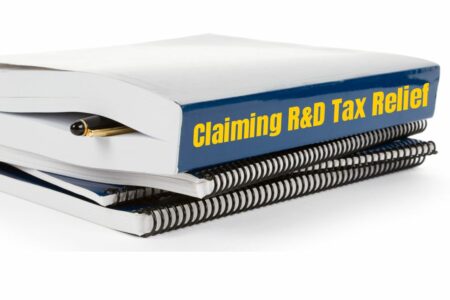Working in this niche area of tax advice means the larger online repositories of case law seem expensive as you are paying for a lot of content you will not use day-to-day.
This list looks briefly at each of the legal cases relevant to R&D tax relief. We’ll update it with every new case decided, so bookmark the page as a quick reference guide for the future.
If you’re looking for more details, including key takeaways and copies of the hearing notes, we have all of this in our Knowledge Bank for members. Learn more about membership.
R&D Tax Relief Tribunals and Judicial Review Decisions
Last updated: April 2025
Sign up for notifications about new summaries.
I.R. R&D LLP (TC09438) – 28 February 2025
L.R. R&D LLP appealed after HMRC disallowed £14.7m in tax losses, spanning 3 accounting periods between 2014 to 2017. These losses included claims for Research & Development (R&D) spending on drug delivery technology.
The LLP argued it was genuinely trading to make a profit and qualified for R&D tax relief (Corporation Tax Act 2009 – CTA 2009). HMRC contended it was a tax avoidance scheme, the spending wasn’t solely for trading purposes (s54 CTA 2009), and wasn’t a trade “with a view to profit” (s1273 CTA 2009). The Tribunal agreed with HMRC, dismissing the appeal.
Assembly Global Networks Ltd (TC00023) – 16 December 2024
Assembly Global Networks Ltd (AGN) submitted an amended Corporation Tax (CT) return, including a claim for R&D credit. HMRC paid the credit, then sent an enquiry letter to AGN’s registered office. AGN claimed they didn’t receive the letter by the deadline and applied to close the enquiry. The First-Tier Tribunal (FTT) found that the letter was properly addressed, franked, and posted.
Although there was postal disruption, the FTT determined the deeming provision of the Interpretation Act applied, and the letter was deemed delivered. AGN’s appeal was denied because non-receipt was not proven. The Upper Tribunal also denied AGN’s appeal, finding no errors in the FTT’s decision.
Stage One Creative Services Ltd (SOCS) (TC09358) – 25 Nov 2024
Stage One Creative Services Ltd successfully appealed HMRC’s decision to deny SME R&D tax relief (under Part 13 CTA 2009) for 2017-2019.
HMRC argued the company’s R&D spending on innovative customer projects was disqualified because it was effectively paid for by the customer (“subsidised”, s. 1138 CTA 2009) and the R&D itself was contracted by the customer.
The Tribunal found the R&D was not subsidised or contracted out; clients paid for the final product, while the subcontractor controlled the R&D. For older years assessed via discovery, (Sch 18 FA 1998) the Tribunal found SOCS followed the accepted “practice generally prevailing” (PGP) at the time (Para 45, Sch 18 FA 1998). This practice, reflected in older HMRC guidance (pre-Nov 2021), didn’t automatically exclude R&D for customer projects. Therefore, HMRC couldn’t argue unawareness, (Para 44, Sch 18 FA 1998) so attempts to reopen earlier tax years also failed.
Collins Construction Limited (TC09332) – 21 Oct 2024
The FTT ruled against HMRC and in favour of Collins Construction Limited. HMRC argued that Collins’ expenditures on 27 projects did not qualify for relief as they were “subsidised expenditure” incurred for “contracted out” activities. The tribunal referenced Quinn Ltd v HMRC to refute the first point, finding that standard commercial payments do not constitute a subsidy.
They also supported Collins’ assertion that the “contracted out” activities only took place in response to unforeseen technical challenges. So, HMRC was rebuffed on both accounts.
Strictly Money Limited – TC09296 – 20 Sept 2024
Strictly Money Limited’s R&D tax relief claim for £297,000 was rejected by HMRC. HMRC argued that Strictly Money was not “carrying on a trade” during the relevant period, a necessary condition to qualify for R&D tax relief
The company needs to show that the R&D activities relate directly to the trade they are carrying out. The Tribunal found that the company’s “technology-based business idea” was “nowhere near commercial viability” and therefore did not constitute a trade. Plus, the Tribunal found no “meaningful evidence” that the subcontractor had carried out any R&D work, despite the subcontractor fees making up the majority of the claimed expenditure.
Tills Plus Ltd (TC09235) – 11 July 2024
The outcome was mixed, but the critical question went in favour of HMRC. The Tribunal ruled that indirect payments could meet the “paid” requirement. Due to inconsistencies and unreliable evidence, the Tribunal also concluded that Tills Plus failed to prove the work achieved scientific or technological advancement, so they upheld HMRC’s rejection of the claim.
Get Onboard Ltd, in liquidation (TC09238) – 09 July 2024
A win for the taxpayer insofar as their entitlement to claim R&D tax relief was allowed. Unfortunately for Get Onboard Limited (GOL), they were in liquidation but the tax credit had previously been applied to unpaid PAYE liabilities. So, HMRC couldn’t employ the “Going Concern” argument.
HMRC rejected the software claim saying it was a routine advance readily deducible by a competent professional. GOL provided lots of evidence to the contrary, which HMRC consistently rejected without providing any evidence of their own. They argued that the ‘burden of proof’ was on the taxpayer. The Tribunal disagreed and clarified that the ‘burden of proof’ shifts between parties, dependant on who has provided the strongest base of evidence for their own argument. Ultimately they allowed GOL’s tax relief claim.
Flame Tree Publishing Ltd (TC09149) – 25 April 2024
The Tribunal agreed with HMRC’s decision to reject their R&D tax relief claim because they did not meet the “qualifying” tests as per the BEIS Guidelines. The company couldn’t provide evidence from a competent professional in the relevant field, or outline the specific activities undertaken to resolve the technological uncertainties. So, HRMC said that the key provisions in the Guidelines were not met, and the Tribunal agreed.
H&H Scaffolding Ltd (TC09082) – 16 February 2024
The Tribunal held in favour of the company, saying that when a claimant of R&D tax relief is found by HMRC to not qualify, it does not automatically follow that they have been careless and should pay a penalty. In this case the Tribunal found the company had taken reasonable care to avoid an inaccuracy penalty.
Bureau Workspace Ltd – Judicial Review – 11 January 2024
This judicial review decision agreed with HMRC’s decision to reject the “late claim” because it did not meet the requirements of extra statutory concession SP5/01. To make a complete and correct R&D tax relief claim, this case reminds us that taxpayers need to submit both a CT return and computation within the normal time limit.
MW High Tech Projects Ltd – TC09011 – 5 December 2023
The Tribunal agreed with HMRC’s rejection of the £1.9m RDEC claim relating to 30 December 2017 because the latest published accounts were not prepared on a “going concern” basis. By 30 December 2019, the last date an amendment to the December 2017 return could be made, the latest published accounts were for December 2017 & 2018 and neither met the “going concern” condition.
Megablue Technologies Ltd – TC/2020/00662 – December 2021
The Tribunal dismissed the company’s appeal against HMRC’s refusal to pay an R&D tax credit because the company was in liquidation. The company argued that the delay in paying the tax credit had contributed to their demise, saying HMRC had acted unfairly or unreasonably. Instead, the Tribunal found HMRC’s actions were in accordance with the legislation, and they had no power to consider whether HMRC had acted unfairly or unreasonably.
Grazier Learning Ltd – TC08282 – September 2021
The Tribunal agreed with HMRC that the Company had failed to provide sufficient evidence that R&D had taken place. The person leading the project was not a competent professional in the field of software engineering. HMRC’s position was the Company had made novel use of existing software platforms or had adapted existing software in a manner that was readily deducible by a CP working in software development.
DNAE Group Holdings Ltd – TC/2018/04348 – July 2021
Similar to the Pyreos Ltd case heard back in 2014, the Tribunal agreed in favour of DNAE, that it met the definition of an SME, despite some of its shares being held by a large company. Again, the Tribunal confirmed, the shareholding was by a venture capital company which allowed therefore a claim for enhanced expenditure as an SME.
Soapbox Communications Ltd – TC08117 – April 2021
The Tribunal found in favour of HMRC saying that the inclusion of a c/o in the address did not prevent the enquiry notice from being properly served to the Company at the registered office address and therefore the closure notices to remove the R&D tax relief were also valid.
Quinn (London) Ltd – TC/2020/01846 – June 2020
The Tribunal disagreed with HMRC’s interpretation of the “otherwise met” clause in s1138(1)(c) CTA09. HMRC’s argument centred on the fixed price contract payment by one of Quinn’s customers meeting this definition so the R&D expenditure was being subsidised. If HMRC had won, the SME claim would have been denied but a claim under RDEC was possible.
Interestingly, the Tribunal judge said if HMRC’s approach were to be adopted, the circumstances in which an SME could claim enhanced relief would be confined to those where it has no prospect of exploiting the R&D for commercial gain. Learn more about the implications of this case.
Related Training: Subcontracting – The rules of the SME scheme & how they’re applied in practice
AHK Recruitment Ltd – TC/2018/06751 – November 2019
The Company’s appeal failed because they could not provide HMRC or the Tribunal with sufficient evidence that R&D had taken place. There was no evidence from a competent professional in the field of software development to prove how the software was materially different or appreciably improved compared to readily available software solutions.
Hadee Engineering Ltd – TC/2018/01111 – November 2019
The Tribunal upheld HMRC decision to remove the bulk of the R&D tax relief claims for enhanced expenditure following enquiry, mainly because the company failed to provide enough evidence that the activities and expenditure met the qualifying criteria.
Teksolutions-Inc Ltd – TC0745 – September 2019
The Tribunal dismissed the Company’s appeal against HMRC’s action to reduce the 2015 tax losses to nil. It was found that there was a lack of credible, documentary evidence to support the claimed expenditure. The Tribunal also concluded there were inaccuracies in the CT returns and therefore the associated penalty was also payable.
Gas Recovery and Recycle Ltd – TC05473 – Sept 2016
The Tribunal ruled in favour of HMRC and allowed them to reduce the R&D tax relief claim for March 2013. This was because £1.1m subcontractor expenditure had been included in the claim, but no subcontractor payments had been made by the filing date.
It is not possible to put in an anticipatory claim before payments for the expenditure have been made. R&D claims must only include expenditure that meets the “paid” requirements, which can be found in CIRD82100.
Related Training: Qualifying Costs and Apportionments
Pyreos Ltd – TC04328 – December 2014
The Tribunal agreed Pyroeos Ltd met the SME definition as an autonomous company although over 25% of its shares were held by a large corporate group. They concluded that the shareholding was held by a venture capital company, which allowed the claim for enhanced expenditure as an SME, which was being denied by HMRC.
Gripple Ltd – High Court of Justice – May 2010
The Tribunal refused the appeal made by Gripple that the payments made to its subsidiary company should be treated the same as salary payments of its controlling director and eligible for inclusion in enhanced expenditure as “staffing costs”. HMRC sought to disallow the claim saying that the payments were for an externally provided worker and being a director of Gripple excluded these costs from the claim.
BE Studios v Smith Williamson Ltd – High Court HC04C0110 – December 2005
This was a civil case heard in the High Court which did not involve HMRC. However, it does provide early clarification of the correct approach to qualifying R&D activities and quantifying R&D expenditure. Understanding the legislation and guidelines and referring to project documentation, as well as consulting people undertaking the work, are all cited as part of this approach.
The judge found that there was no evidence presented that supported the claim that R&D within the BEIS Guidelines (formerly DTI Guidelines) had been carried out.
This case is referred to within HMRC’s guidance manual at 81300 & 80520.
Looking for analysis of R&D Tax Relief Case Law?
We’ll continue to update this list with every new case decided, so bookmark the page as a quick reference guide for the future.
If you’re looking for more details, including key takeaways and copies of the hearing notes, we have all of this in our Knowledge Bank for members. Learn more about membership.





